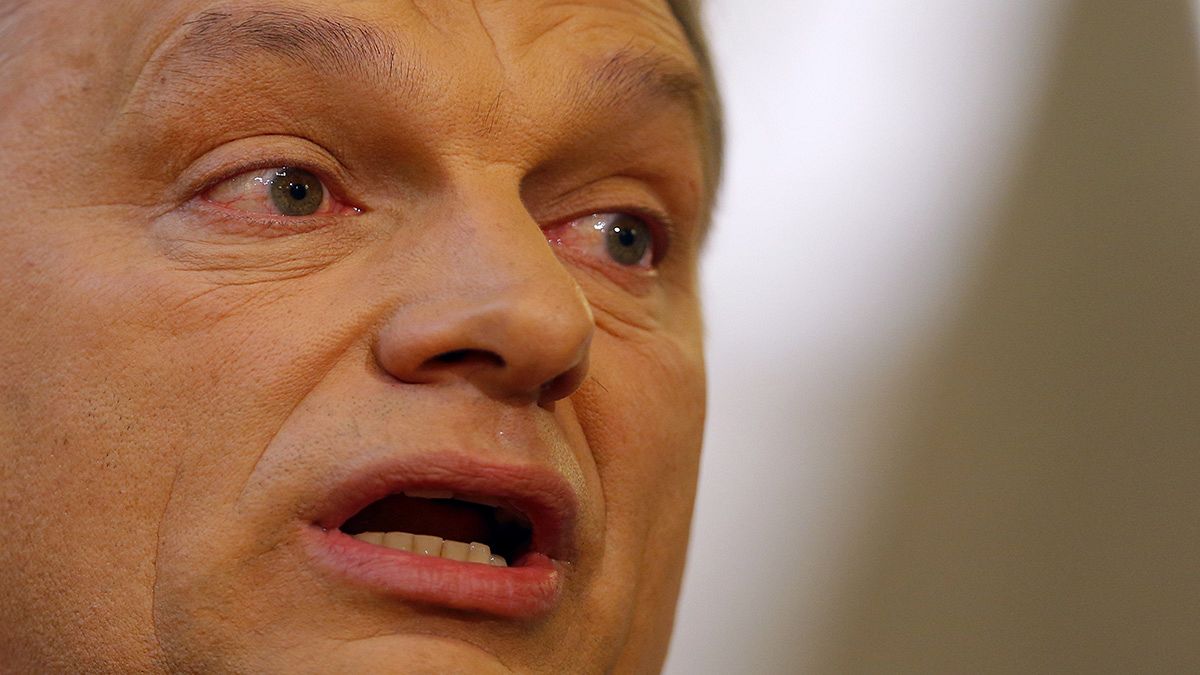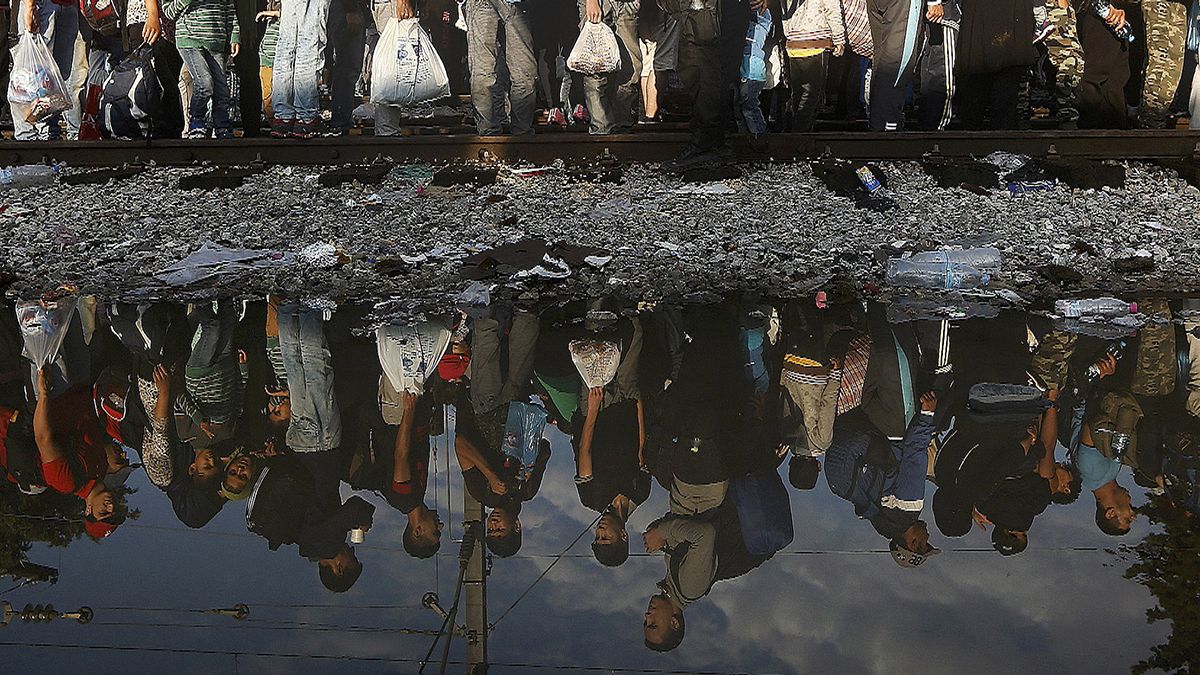Europe’s unprecedented migrant crisis has stirred controversy and polarised opinion. The key dispute is over whether the majority of arrivals are
Europe’s unprecedented migrant crisis has stirred controversy and polarised opinion.
The key dispute is over whether the majority of arrivals are political refugees or simply economic migrants in search of a better life.
But there are plenty of other claims and counter claims banded around to try and influence opinion.
Here we look at some of the most common assertions:
 Orban: majority are economic migrants
Orban: majority are economic migrants
The majority arriving are economic migrants not refugees
This is one of the most commonly made claims. Hungary’s prime minister Viktor Orban says the ‘overwhelming majority’ of migrants are not refugees, an assertion echoed by his Slovak counterpart Robert Fico.
Amnesty International says 244,000 people have arrived by sea to the Greek islands in 2015, 90 per cent of whom are from Syria, Afghanistan and Iraq, countries whose fleeing citizens have a clear case for asylum.
Iverna McGowan, Amnesty’s refugee spokeswoman, said: “This flies in the face of any allegations that a majority are economic migrants, it’s clear that this is a refugee crisis we have on our hands.
“We have not seen any hard evidence of this [that the majority are economic migrants]. We have our own researchers on the ground as citizens across Europe, who have come into contact and heard the human stories and the reality that people are fleeing war.
“Will there be people who are economic migrants? Yes I’m sure that’s the case but it doesn’t negate the fact that first of all there has to be a full, robust procedure to establish what the case is.”
However Amnesty’s figures do not take into account those asylum seekers or migrants who travel northwards from Kosovo and Albania.
Listen to the full interview with Amnesty's refugee spokeswoman Iverna McGowan
2.  Farage: migrants dumping passports
Farage: migrants dumping passports
Migrants turn up in Europe and claim they are Syrian
Nigel Farage, leader of anti-immigration UKIP, claimed on Channel 4 News: “The evidence this week already is that people throw their passports into the Mediterranean and say they have come from Syria.”
Iverna McGowan, Amnesty’s refugee spokeswoman, said there was no evidence of this, adding: “Clearly there are asylum procedures that have to be gone through and identification processes.”
But Fabrice Leggeri, head of Europe’s border agency Frontex, said a market in fake Syrian passports had sprung up, particularly in Turkey.
British newspaper The Guardian says this market is being fuelled by Germany and Sweden looking favourably on those from the war-ravaged state.
While the market may exist, we do not know its scale. Frontex did not have any figures on how many were arriving in Europe with fake Syrian passports, but said several countries had indicated they had seen such cases.
3.  ISIL – sending fighters?
ISIL – sending fighters?
ISIL is sending jihadists to Europe among migrants
Spain’s interior minister Jorge Fernandez Diaz has called for tighter controls around refugees and migrants entering Europe.
He told ABC newspaper: “The immense majority are refugees who are fleeing war and terror but we cannot forget ISIL and its barbarians are in Syria and that they have shown they are capable of executing their threats.
“Who could doubt the fact people who are not refugees could have infiltrated themselves among this avalanche (of migrants)?”
British newspaper The Daily Express claimed more than 4,000 ISIL jihadists had been smuggled into Europe among refugees.
But Charlie Winter, a senior researcher on jihadism at Quilliam Foundation, said there was no evidence for the claim and said ISIL had other priorities.
He added: “While it’s a very scary idea militants could be smuggled in amidst refugees across borders it’s a very high-risk approach if they are militants that have been given specific orders to carry out specific operations. It’s pretty damn foolhardy and I don’t think it would necessarily be the most logical way to do it.
“Islamic State’s chief concerns at the moment are keeping control of the terrain it handles in Iraq and Syria and ensuring that it doesn’t lose ground against the many different forces that are attacking it now.
“While of course it is beneficial [to ISIL] to carry out attacks in the west and scare people and be notorious and infamous these attacks do not need to be planned from the very highest echelons of Islamic State.”
Iverna McGowan, Amnesty International’s refugee spokeswoman, said: “There is no evidence that is the case. A significant number of those fleeing Syria are fleeing ISIL, other armed groups and of course the Syrian regime.”
Of the key terrorist attacks in France this year, the majority of assailants or suspected assailants were born in the country, rather than being smuggled in from outside. These include Yassin Salhi, suspect in the attack near Lyon in June 2015; the Kouachi brothers (Charlie Hebdo); and Amedy Coulibaly (Paris attacks).
After we conducted interviews for this claim, it emerged an ISIL terrorist, posing as an ‘asylum seeker’, had been arrested by German police in Stuttgart.
4.  Vučić: ‘benefits attract asylum seekers’
Vučić: ‘benefits attract asylum seekers’
The majority of asylum seekers are coming into Europe to pick up generous benefits
Serbian prime minister Aleksandar Vučić has claimed benefits paid to asylum seekers are responsible for migrants heading to his country.
Asylum seekers are given subsistence allowances while their applications are being considered.
Single adult asylum seekers get 88.50 euros in Germany; 85.87 euros in France; 56.50 euros in Sweden; 47.05 euros in the UK; 42.56 euros in the Netherlands; and 3.75 euros in Hungary.
So does the amount given influence where asylum seekers apply?
Figures from Eurostat for January to March 2015 show Germany had the most asylum applications, with 73,120. Of the countries where we detailed how much they gave asylum seekers in allowances, Hungary was next with 32,810; followed by France (14,775); Sweden (11,415); United Kingdom (7,330); and the Netherlands (2,420).
Iverna McGowan, from Amnesty International, said: “We’ve seen the vast majority of people are fleeing war and poverty. If you look at how difficult these journeys are, the number of deaths and lack of dignity in their journeys it again tells you about the push factors.
“This is not exactly an easy ride into Europe. It is an extremely harrowing journey and one that has to be stopped by giving safe and legal access to those in need of protection.”
5.  Cameron: concerned over pull factors for migrants
Cameron: concerned over pull factors for migrants
Accepting more migrants and refugees will encourage even more to comeBritish PM David Cameron, speaking about the European Commission’s proposal to relocate 40,000 migrants from Italy and Greece earlier this year, said it was not a good idea because it can act as a draw to people who want to come to Europe.
But Amnesty International rejects this claim, comparing it to suggestions that more migrants were being encouraged to cross the Mediterranean by comprehensive search-and-rescue operations.
“This is an old claim, isn’t it?” said Amnesty’s Iverna McGowan. “We had exactly the same rhetoric around the story of Mare Nostrum as you might remember. It was claimed that if there was not a fully fledged search and rescue operation, such as Mare Nostrum, people would stop coming. The opposite happened. After they disestablished Mare Nostrum the numbers of people actually increased. What does that tell you about the push factors? What is pushing people to take these treacherous routes is that they are fleeing desperate conflicts, war and poverty, and that is what the reality of the situation is.”
Italy’s extended search-and-rescue operation, Mare Nostrum, was replaced with Triton, a cheaper, less proactive EU alternative on November 1, 2014.
Two months on and despite the scaled back operation, migrants continued to come, according to data for sea arrivals to Europe from the UN’s refugee agency.
The figures, shown below, reveal migrant numbers in the first four months of 2015 continued to grow, compared with the same period a year before.
In April 2015 the EU pledged to treble funding for its search-and-rescue operations in the Mediterranean.
6.  Hungary: disease fear?
Hungary: disease fear?
Migrants are bringing new diseases into Europe
Much of the focus of the migrant crisis over the past fortnight has been on Hungary, which had nearly 33,000 asylum requests in the first quarter of 2015, the second highest figure in the EU, according to Eurostat.
Pictures have emerged this week of Hungarian police wearing face masks while dealing with migrants.
The journalist who was sacked by her TV station after tripping up a migrant was also seen to be wearing one.
Petra Laszlo: “I’m not a heartless, racist, child-kicking cameraman.” http://t.co/4pn7dR1Q50pic.twitter.com/gi8SqmCiV2
— euronews (@euronews) September 11, 2015
Gregory Hartl, spokesman for the World Health Organisation, told Euronews: “In spite of a common perception that there is an association between migration and the importation of infectious diseases, there is no systematic association. Communicable diseases are primarily associated with poverty. Refugees and migrants are exposed mainly to the infectious diseases that are common in Europe, independently of migration.
“The risk that exotic infectious agents, such as Ebola virus or Middle East respiratory coronavirus (MERS-CoV), will be imported into Europe is extremely low, and experience has shown that, when it occurs, it affects regular travellers, tourists or health care workers rather than refugees or migrants.”
